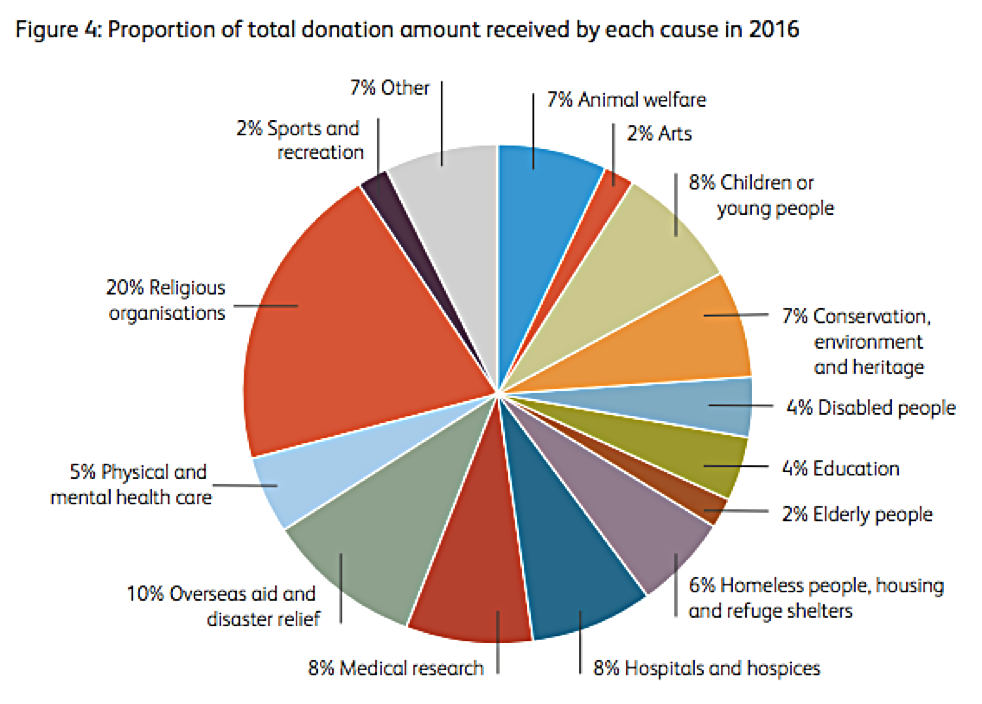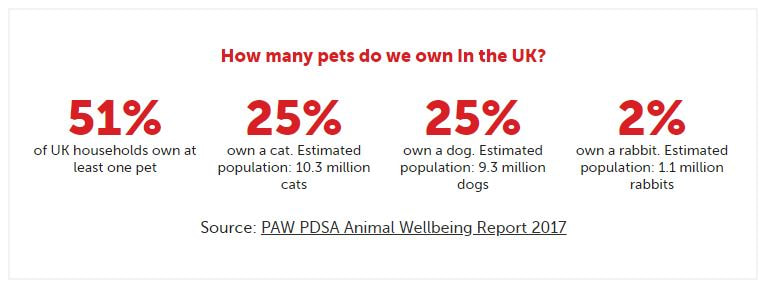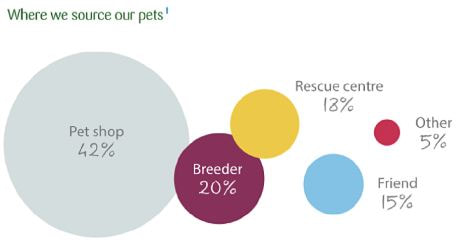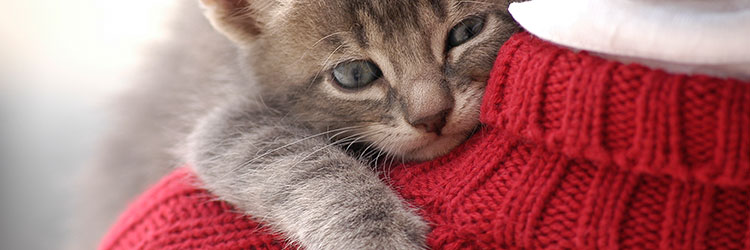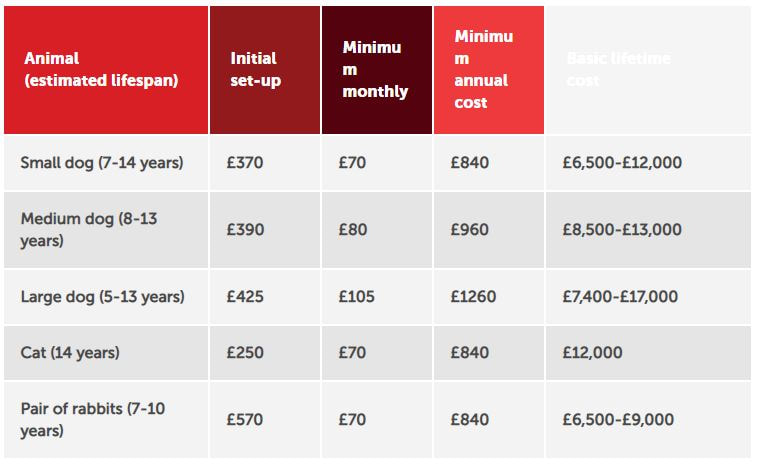Pets are incredible. But not all are treated equally. Some animals have a terrible start in life and the fortunes of others can take a turn for the worst. Many find themselves in rescue centres waiting to be placed in a new home.
Adopting one of these pets can be hugely rewarding. You’ll not only develop a close bond but witness them grow in confidence and happiness. There are thousands of dogs, cats, rabbits, and other animals looking for a fresh start in life. And you could be their new best friend. A summary of what this article contains.
Before you adopt
Assessing your suitability for different needs
Have you thought about adopting…?
Before you Adopt
With almost all the rehoming shelters in the UK consistently close to capacity, it’s normally quite easy to find the perfect pet in a rescue centre. You’ll also be adopting an animal who might not otherwise find a loving home, rather than encouraging more breeding.
But owning any pet is a commitment. Before you decide to rescue an animal, you’ve got to think about whether it’s right for both of you. We’re here to help you find everything you might need to decide which type of pet suits your lifestyle, and how to care for different animals.
Adopting one of these pets can be hugely rewarding. You’ll not only develop a close bond but witness them grow in confidence and happiness. There are thousands of dogs, cats, rabbits, and other animals looking for a fresh start in life. And you could be their new best friend. A summary of what this article contains.
Before you adopt
- Rescue animals: Myths vs facts
- The importance of animal rescue
- Benefits of adopting
- Is it right for you?
- An introduction to owning a pet
Assessing your suitability for different needs
Have you thought about adopting…?
- Older pets
- Unfavourable breeds
- Smaller pets
- What to expect
- The importance of adoption criteria
- Expert advice
- Preparing your home for a new animal
- How much does it cost to look after a pet?
Before you Adopt
With almost all the rehoming shelters in the UK consistently close to capacity, it’s normally quite easy to find the perfect pet in a rescue centre. You’ll also be adopting an animal who might not otherwise find a loving home, rather than encouraging more breeding.
But owning any pet is a commitment. Before you decide to rescue an animal, you’ve got to think about whether it’s right for both of you. We’re here to help you find everything you might need to decide which type of pet suits your lifestyle, and how to care for different animals.
Rescue animals: Myths vs facts
Myth: Rescue animals are dangerous.
Reality: Some animals have behavioural issues, but rescue centres won’t rehome dangerous animals.
Rescue centres have a duty to rehome safe and healthy animals. Not only do they get a full check-up at the vets, their behaviour will be assessed by experts with experience and knowledge of specific breed traits.
They’ll spend time with the animal, finding out what they’re like and what sort of home, lifestyle and environment would suit them. They’ll decide whether they can live with other pets, and if they’re good with children of different ages.
Myth: Animal charities get the most donations.
Reality: Donations given to human charities dwarf those given to animal charities.
While it’s true that animal welfare is a top cause people donate to, it doesn’t get the most money. The CAF UK Giving Report stated 25% of UK adults had given to animal welfare causes in the last four weeks. Over the entire year of 2016, those causes only got 7% of the total donation amount.
Myth: Rescue animals are dangerous.
Reality: Some animals have behavioural issues, but rescue centres won’t rehome dangerous animals.
Rescue centres have a duty to rehome safe and healthy animals. Not only do they get a full check-up at the vets, their behaviour will be assessed by experts with experience and knowledge of specific breed traits.
They’ll spend time with the animal, finding out what they’re like and what sort of home, lifestyle and environment would suit them. They’ll decide whether they can live with other pets, and if they’re good with children of different ages.
Myth: Animal charities get the most donations.
Reality: Donations given to human charities dwarf those given to animal charities.
While it’s true that animal welfare is a top cause people donate to, it doesn’t get the most money. The CAF UK Giving Report stated 25% of UK adults had given to animal welfare causes in the last four weeks. Over the entire year of 2016, those causes only got 7% of the total donation amount.
Myth: All rescue animals are old, mixed breeds or have medical issues.
Reality: Rescue centres have all kinds of animals.
Some people believe animals wouldn’t end up in shelters unless there was something wrong with them. That’s not the case. Rescue centres are full of wonderful family pets, and it’s possible to rescue puppies or kittens too. It might take longer to find your favourite breed, but it’s possible. Rescue centres can’t predict what’s going to come through their gates, but you’ll often find a mix of pure and cross breeds.
Myth: Adopting is too expensive.
Reality: It’s generally cheaper than buying a non-rescue.
Before animals are put up for adoption, they’ll be given a check-up and should come with a clean bill of health. This could include worming, flea treatment, vaccinations and neutering. You could end up saving quite a bit of money. Adoption fees are usually much less than you’d pay a breeder too, especially for pure breeds.
Myth: You won’t know enough about the pet.
Reality: The history of some pets is unknown, but carers learn a lot before rehoming.
Although rescue centres get animals with limited information on their history, they always take time to get to know pets before rehoming them. Thanks to behavioural and temperament checks, you’ll have a good idea how your new pet will act in your home. Always give them plenty of time to settle in, though.
The importance of animal rescue
It was only in 2007 that the Animal Welfare Act became law in England, shortly after it was implemented in Wales. It’s largely agreed that it’s the most important piece of animal welfare legislation for nearly 100 years. The Act makes it your legal responsibility as a pet owner to care for your animals properly.
Before this change, legal action could only be taken if an animal had already suffered from abuse. Now, experts can prevent suffering from happening and be proactive, providing owners with guidance before any pet comes to harm.
But do pet owners know this? This year, according to the PAW PDSA Animal Wellbeing Report 2017, 39% of owners said they understood the Animal Welfare Acts. But 34% of owners still feel they’re not familiar with the acts, and 27% have never heard of them.
In the worst-case scenarios, owners neglect their responsibilities. Abuse statistics in the UK are worrying. In 2016, the RSPCA investigated nearly 85,000 cases involving dogs and over 36,000 complaints of cruelty regarding cats. Many of the animals who turn up in rescue centres arrive neglected and sick, requiring urgent veterinary care.
That’s not always the case, though. Animals are abandoned for several reasons:
Contributing factors include:
When you adopt an animal, you’re improving its quality of life. But it’s not just your new friend who’ll benefit. Having a pet has many advantages for you too:
More benefits of adopting a rescue animal:
Reality: Rescue centres have all kinds of animals.
Some people believe animals wouldn’t end up in shelters unless there was something wrong with them. That’s not the case. Rescue centres are full of wonderful family pets, and it’s possible to rescue puppies or kittens too. It might take longer to find your favourite breed, but it’s possible. Rescue centres can’t predict what’s going to come through their gates, but you’ll often find a mix of pure and cross breeds.
Myth: Adopting is too expensive.
Reality: It’s generally cheaper than buying a non-rescue.
Before animals are put up for adoption, they’ll be given a check-up and should come with a clean bill of health. This could include worming, flea treatment, vaccinations and neutering. You could end up saving quite a bit of money. Adoption fees are usually much less than you’d pay a breeder too, especially for pure breeds.
Myth: You won’t know enough about the pet.
Reality: The history of some pets is unknown, but carers learn a lot before rehoming.
Although rescue centres get animals with limited information on their history, they always take time to get to know pets before rehoming them. Thanks to behavioural and temperament checks, you’ll have a good idea how your new pet will act in your home. Always give them plenty of time to settle in, though.
The importance of animal rescue
It was only in 2007 that the Animal Welfare Act became law in England, shortly after it was implemented in Wales. It’s largely agreed that it’s the most important piece of animal welfare legislation for nearly 100 years. The Act makes it your legal responsibility as a pet owner to care for your animals properly.
Before this change, legal action could only be taken if an animal had already suffered from abuse. Now, experts can prevent suffering from happening and be proactive, providing owners with guidance before any pet comes to harm.
But do pet owners know this? This year, according to the PAW PDSA Animal Wellbeing Report 2017, 39% of owners said they understood the Animal Welfare Acts. But 34% of owners still feel they’re not familiar with the acts, and 27% have never heard of them.
In the worst-case scenarios, owners neglect their responsibilities. Abuse statistics in the UK are worrying. In 2016, the RSPCA investigated nearly 85,000 cases involving dogs and over 36,000 complaints of cruelty regarding cats. Many of the animals who turn up in rescue centres arrive neglected and sick, requiring urgent veterinary care.
That’s not always the case, though. Animals are abandoned for several reasons:
- Owners getting sick or passing away
- Family changes (e.g. separation or having children)
- Moving to unsuitable accommodation
- A failure to understand the time and financial commitment of owning a pet
Contributing factors include:
- Unneutered pets. Animals not spayed or neutered often add to the problem of unwanted pets. Cats are particularly prolific breeders. One unneutered female cat can produce 18 kittens a year.
- A lack of research. Some people give up their pets once they realise the commitment of looking after an animal.
- Irresponsible owners. Not everyone treats animals with care, with some owners even dumping their pets so they can go on holiday. Not being prepared for pet ownership in the first place is a growing problem.
- Online selling. Selling animals online – even on places such as Gumtree or Preloved – has made it all too easy for people to see animals as a product to buy and sell. A pet should be for life, not something you sell once you no longer find it cute.
- Trends. Unfortunately, animals go in and out of fashion.
- Lost pets without microchips. Animals go missing and are stolen. Without a microchip, it can be hard to trace the original owner.
When you adopt an animal, you’re improving its quality of life. But it’s not just your new friend who’ll benefit. Having a pet has many advantages for you too:
- It’s good for your health. Ever since the 1980s, research has shown pet ownership can have benefits for your health. These include visiting the GP less, a reduced risk of heart disease and improved psychological wellbeing.
- Encourages fitness. Pets – especially dogs – need regular exercise. They’re the extra motivation you need to be active every day. According to a recent survey, 36% of pet owners said having a pet has helped them lose weight.
- Teaches responsibility to children. Having a pet teaches kids valuable lessons about the responsibility of feeding, exercise and care. They’ll never realise they’re learning either, as they’re simply having fun with a new friend in the home.
- Improved happiness. After even the most hectic and stressful day in the office, coming home to a pet can be enough to boost your mood. Research has shown that cuddling a pet releases a chemical called oxytocin in both humans and animals. This has a calming and soothing effect.
- Increased social interaction. Not only do pets help with feelings of loneliness, they can encourage people to get outside and socialise. Whether that’s a dog training class, or just walking around your local park, the increased independence can be a great help.
More benefits of adopting a rescue animal:
- Your pet will be healthy. A rehomed animal should come with a clean bill of health. Pets will be up-to-date with vaccinations and all medical essentials, including neutering. What’s more, many will come housetrained and understand basic commands.
- Fighting puppy and kitten farms. Rehoming centres support vulnerable animals and aim to create lasting change for the pet population. Adopting from them is a responsible choice which supports a great cause, rather than adding to the growing problem of puppy and kitten farms. These places breed animals in horrible conditions, which uneducated buyers rarely see, as the litters are transported away from their mothers at a young age. It can damage their immune systems and impair their lifespan. The extent of this practice is alarming, as less than 12% of puppies in the UK are bred by a licenced breeder.
- It helps more than one animal. When you adopt an animal, it frees up space for another to be saved.
- It’s cheaper. Rescue pets will normally come neutered, microchipped and vaccinated. It can be great value compared to the money you’ll spend when you buy from a breeder. It’s also generally cheaper to adopt than buy.+
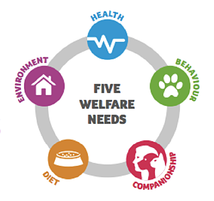
Is it right for you?
Pets play an enormous role in people’s lives. Getting one shouldn’t be an impulse decision. They’re a huge responsibility, as well as a financial and time commitment.
Yet surprisingly, 5.2 million pet owners don’t do any research before taking on a new pet.
First and foremost, you should make sure you can meet five animal welfare needs:
- Health. Owners must make sure their pets are healthy and take them to a vet for advice if they’re ill or injured.
- Behaviour. Owners are responsible for allowing and encouraging normal behaviour patterns.
- Companionship. Varying from one pet to another, they might need more of your time and/or the company of other animals.
- Diet. Animals must be given the right type and amount of food.
- Environment. Pets need a safe and suitable place to live.
But not everyone makes the right decision. While we’re generally a nation of pet lovers, even the best intentions can go astray. Currently, key problems identified by PDSA include a lack of exercise, obesity and separation anxiety. They’re all largely caused by poor judgement calls, and can easily be prevented with a wider awareness of different pets’ needs.
Before buying or adopting, The Blue Cross has the following advice for would‐be pet owners:
- Rethink your ideas. The pet you’d like might not necessarily be right for you. It’s important to do your research before you commit to one animal or breed.
- Think about your lifestyle. As part of your research, you’ll have to investigate what’s best suited to your home life. Consider the size, temperament, exercise needs, lifespan and health tendencies of different pets and breeds.
- Don’t impulse buy. It’s easy to be tempted by gorgeous photos of cute pets, but getting a new animal isn’t something you should do on a whim. It’s a long-term commitment. Give the decision the time it deserves.
- Do your sums. You’ll need to work out whether you can afford a new pet. Ongoing costs can include insurance, food, toys and unexpected vet bills.
Choosing the right pet
No animal is the same. Not only do they have different needs, they’ve all got personalities of their own.
Even within breeds, there could be huge variations. To care for a pet as best you can, you should always pick one you can provide for the needs of.
An introduction to owning a pet
Even within breeds, there could be huge variations. To care for a pet as best you can, you should always pick one you can provide for the needs of.
An introduction to owning a pet
Dogs
Ever since dogs were first domesticated over 33,000 years ago, they’ve been our best friends. Well-loved by most people, dogs bring us happiness. It’s not without effort from owners though, who must exercise, feed and provide a suitable home.
But 1.2 million dog owners (13%) did no research at all before taking on their pet. Without prior knowledge, owners could fail to recognise the needs of different breeds and personalities. It’s always worth doing more research on a specific breed.
Environment: Dogs should be given their own bed where they’re allowed to rest undisturbed when they want to. Daily exercise is also important for their well-being, and playing with toys can keep their minds active. Keep any hazardous materials out of reach in the home, and be careful when you’re out and about.
Diet: How much you feed your dog is down to its age, size, and the amount of exercise it’s doing. All dog owners need to be wary of how many treats their dog is given. Unfortunately, chubby dogs are increasingly seen as normal, when all breeds should be kept in sleek shape.
Ever since dogs were first domesticated over 33,000 years ago, they’ve been our best friends. Well-loved by most people, dogs bring us happiness. It’s not without effort from owners though, who must exercise, feed and provide a suitable home.
But 1.2 million dog owners (13%) did no research at all before taking on their pet. Without prior knowledge, owners could fail to recognise the needs of different breeds and personalities. It’s always worth doing more research on a specific breed.
Environment: Dogs should be given their own bed where they’re allowed to rest undisturbed when they want to. Daily exercise is also important for their well-being, and playing with toys can keep their minds active. Keep any hazardous materials out of reach in the home, and be careful when you’re out and about.
Diet: How much you feed your dog is down to its age, size, and the amount of exercise it’s doing. All dog owners need to be wary of how many treats their dog is given. Unfortunately, chubby dogs are increasingly seen as normal, when all breeds should be kept in sleek shape.
Behaviour: To learn how to interact with other dogs and people, puppies should be socialised. It’s important for them to experience lots of everyday sights and sounds, so they know how to react naturally. Non‐socialised dogs are more likely to have behavioural problems as they grow older. Be wary of rescue dogs. Even older rescues may need to be slowly introduced to new experiences, and training can gradually teach normal behaviours. Rehoming centres will have started this teaching, and can give you advice on keeping it up.
Companionship: Dogs should only be left alone for four hours, and puppies much less. Every dog will be different, and it’s all down to what they’re used to, but dogs are naturally very social animals. If you’re out for long periods of time, you should consider a dog sitter or walker, or perhaps decide that a different pet will suit you better. You can find pet sitters and dog walkers through the National Association of Pet Sitters and Dog Walkers.
Health: Checking a dog’s health is important in helping you react quickly if anything changes. There are simple things you can do at home to make sure your pet stays in good health.
- Teeth - Gum disease and bad breath are common in dogs, but preventable with regular brushing and veterinary dental checks.
- Eyes and ears - Check for debris, infection or allergies, but don’t attempt to clean regularly. Eyes and ears will only ever need cleaning around the edges. Other symptoms will need a veterinary examination.
- Paws - A dog’s paws can become dry and cracked, so keep an eye out for any sores and moisturise when needed. Nails should also be trimmed by a vet if they grow too long, although regular walks should keep them filed down naturally.
- Skin - You should regularly use flea treatment, and only wash your dog with hypoallergenic shampoos. Skin can become irritated, but brushing means you can monitor the quality of their coat and notice any changes to the skin underneath.
- Weight - A healthy diet is an important health factor, as overweight dogs can suffer joint and mobility problems. Dogs can be greedy and fussy, so it’s down to you to manage their diet and provide the right amount of food.
Naturally curious, independent and cuddly, cats have always made good companions. They’re one of the world’s most popular pets. They don’t need walks, and tend to be happy being left alone for longer periods of time. They can entertain themselves – and quite often, their owners – but their needs shouldn’t be underestimated. They still need love, care and attention.
Environment: Creating an ideal environment for a cat involves giving them somewhere comfortable to sleep undisturbed, as well as access to safe hiding places. Cats tend to feel more secure when they’re up high. They can be fussy and need to be given choice – especially if you have more than one cat. Essentials include their own food and water bowl, litter tray, bed, hiding place and scratching post. You’ll soon learn where your cat prefers to spend time.
Diet: When deciding how to feed your cat, take into consideration their age, weight, body shape, the food packet’s guidelines and veterinary advice. To avoid overfeeding, weigh out the food and either give it all at once, or as several small meals throughout the day. Try and avoid giving your cat treats, as they tend to be full of calories.
Behaviour: Every cat has its own personality. Some can be quite aloof while others will happily have a cuddle. It’s up to you to recognise when your cat feels comfortable, and provide it the lifestyle it needs to be happy. Cat flaps are a great way of providing access to your garden, but consider one that operates by a collar or microchip, so it will only open for your cat. Other cats coming in your home can be stressful for some pets.
Companionship: Generally, cats are solitary animals, and tend to only be friendly to other pets they’ve grown up with. Give them a choice of where they can spend time, to avoid close contact if they want to. Having choice is important in multi-cat households. This is something you should consider when adopting cats. If you don’t already have a cat, perhaps consider adopting a pair who are used to living together.
Health: Even the most independent cats need to be checked regularly, groomed and given treatments to prevent fleas and worms. Ninety-two per cent of cat owners have had their cat neutered, but the importance of microchipping and annual vaccinations should also be emphasised. Grooming is a good way of checking for signs of problems, keeping your cat’s coat in good condition and reinforcing the bond between you.
Rabbits, guinea pigs and other small pets
It would be wrong to assume smaller pets need less attention. Looking after any animal takes time. Rabbits, guinea pigs and other similar pets still depend on their owners for care and shelter. That said, smaller animals can make ideal pets for people who have less time on their hands.
The following summarises some of the key needs when looking after small pets:
Rabbits
- Rabbits are incredibly social – they like to have a friend, but remember to get them neutered.
- Their living space should have somewhere they can dig, run and play.
- They should be given small portions of good quality hay, fresh greens and rabbit nuggets every day.
- Hamsters love to burrow, so they need deep layers of shavings.
- Their cages should be kept in a quieter area of the house.
- They can travel up to five miles a night in the wild – so large cages and exercise balls are necessary.
- Guinea pigs are energetic – they need quite a lot of room to run around in every day.
- Their hutches should be raised off the ground and out of direct sunlight and strong winds.
- Keep them away from flowerbeds, as some plants are poisonous.
- Rats need a cage with different levels to climb, as well as a nest box to rest in during the day.
- As with all small animals, their cages need to be cleaned out regularly. A small amount of old bedding should be left behind to keep familiar scents.
Assessing your suitability for different needs
Owning a pet is something many of us want to do in our lives. But that doesn’t mean we’ll always be able to provide the perfect home for them.
Animals evoke an emotional response in us, so before you get your heart set on Poppy, Buddy, Flash or any other adorable animal, ask yourself the following:
- How much time can you devote to a pet? Time is one of the biggest deciding factors in what pet will suit you best. Be realistic with your work and social commitments. How would a pet fit in?
- Do you know what it’s like to own a pet? For someone who’s never grown up with a pet, the reality of owning one doesn’t always live up to the dream. You could volunteer to look after your friend’s animals to get an insight into what’s needed daily.
- Have you researched the animal and breed? It’s not just about your experience with pets in general. You should also have a good idea of what to expect of the breed’s typical traits.
- What do you want from a pet? Depending on what you’d like to gain, different animals will suit you. If you want an energetic companion who you’ll take jogging with you, a terrier or similar dog could be ideal. Think carefully about what you want, and how it’ll fit into your current schedule.
- Is it the right time? If your situation is likely to change in the not-too-distant future – i.e. you plan on relocating or starting a family – you might have to wait until you’re in a more stable position to offer an animal a home.
For certain animals and breeds, there’s consistent demand. For instance, Labrador puppies won’t stay long in a rehoming centre. As such, if you want a specific breed of dog, you can contact breed rescue organisations using The Kennel Club.
You should also consider less popular breeds and animals. Don’t overlook a pet because it’s not the cutest, or no longer in its prime. If you’re able to adopt, the hardest-to-rehome pets can sometimes be the easiest to fall in love with.
Older pets
A lot of pets end up in rescue centres later in life. This can be disorientating and confusing, especially when they’ve spent most of their lives in loving family homes. Older rescues tend to be overlooked, as potential owners worry about how much time they’d have together, as well as possible vet bills.
But adopting an older pet, and giving it a loving home for its last few years, is hugely rewarding. Your decision means the animal doesn’t have to spend any more time in a shelter, and can relax in peace. Older pets have a lot of love to give.
They’ll also usually come trained, understand basic commands and know how to behave in the home. A lot of time, frustration and destroyed furniture can go into training a puppy. You shouldn’t need to worry about this with older pets. Plus, they tend to settle in easily, and can provide years of happiness snuggled up on the sofa.
Unfavourable breeds
When it comes to dogs, there are breeds which have gained a bad reputation. Staffordshire bull terriers (staffies), for instance, have faced criticism about their aggression. The number of staffies in rehoming centres is largely down to owners failing to train them correctly or keep up with the right amount of exercise. As a result, they can become rowdy and unmanageable.
Any poorly trained dog can become potentially dangerous, especially if they’ve been bullied into aggression or encouraged to act out. But it’s not unique to their breed. Even a tiny Chihuahua can become aggressive if it’s trained incorrectly or mistreated.
With the right training and exercise, all dogs can make great family pets. It’s up to you to shape the behaviour, temperament and attitude your dog displays. They’re often receptive to training and have a desire to please you. With rescue dogs, it’s about unlocking their potential.
This is a large part of what rehoming centres will do. Experts will assess their temperaments, training levels and personalities, working on any areas where they need help before they’re suitable for rehoming.
Despite all the work, though, some breeds (in addition to staffies) will stay in shelters for a long time:
- Mixed breeds. Pedigree dogs are popular, and tend to be chosen over mongrels. Often with undetermined breeding, mixed breed dogs don’t have the exaggerated behaviour traits associated with certain breeds. They make great pets. But you’ve got to be wary of so-called designer breed combinations, which tend to have health problems in later life.
- Lurchers and greyhounds. Known for a more laid-back attitude, these dogs need shorter bursts of exercise. The rest of the time they’d rather lie on the sofa with you. Because of the sheer numbers in rehoming centres, they’re always looking for welcoming homes for these gentle giants.
- Terrier-types. Originally bred with a job in mind, most terriers are active and playful. They enjoy being around people and need a lot of stimulation to keep their lively and intelligent minds content. When boredom sets in, they can become a handful. But they’re perfect for anyone looking for a pet to keep up with their active lifestyle.
Smaller pets
For many people who are unable to give a dog or cat a home, smaller pets – such as rabbits, guinea pigs and rats – can be a fantastic alternative:
- Providing they’ve been handled from a young age, rats and guinea pigs can be great pets for kids, as they’re gentle, curious and affectionate.
- Rabbits can be surprisingly playful and enjoy interacting with people.
- You don’t need to walk smaller pets, who only need large cages to exercise.
- There are a lot of varieties to choose from, with around 50 breeds of rabbit and five species of hamsters kept as pets.
The adoption process
Adopting a new pet can be intimidating. Most people buy their animals from a pet shop or breeder, perhaps worried they won’t receive the help and advice they need from a rescue centre.
Source: The Pet Report 2015
However, rehoming centres pride themselves on offering support throughout your search and after you’ve taken your pet home. Their priority is the health and happiness of animals. As such, don’t expect anywhere to just hand over a pet. It’s far kinder, to both you and the animal, to wait for the right pet for you.
What to expect
Key stages of adoption include:
The importance of adoption criteria
To guarantee the safety of all pets rehomed, rescue centres will have adoption criteria. Typical restrictions include:
Expert advice
There’s a worrying trend to see animals as something you just give up, trade in or get sick of. According to RSPCA research, one in five people who buy a puppy no longer have it two years later.
No-one should take on a pet if they’re not prepared. But what should potential owners know before they adopt?
Caring for a rescue animal
However, rehoming centres pride themselves on offering support throughout your search and after you’ve taken your pet home. Their priority is the health and happiness of animals. As such, don’t expect anywhere to just hand over a pet. It’s far kinder, to both you and the animal, to wait for the right pet for you.
What to expect
Key stages of adoption include:
- Search and register. You should start your search online, browsing the different pets available from local rescue centres. If you’re after a specific breed, you might have to look far from home. At this stage, it’s a good idea to register your interest with rehoming centres. How much information they need from you will vary, but the more detail you can provide, the sooner you’ll find an ideal match.
- Assess suitability. There are things rehoming centres need to know to assess your suitability, such as what other pets you might already have in your home or whether you have kids or not. The staff will have spent a lot of time with the animals, and you should trust their decision. The right pet might not be immediately available, so keep in touch and have an open mind.
- Meet and match with a pet. All members of your family should go and meet potential new pets. Although everyone must be happy with the decision, it’s important to realise the animals might not be completely relaxed in their environment. They could act shy, or even be loud, at this initial meeting. That’s why you’ll be encouraged to visit again and bond more.
- Rehome your new friend. Once you’ve found a suitable match, you can look forward to taking them home. Rehoming staff will be on hand to give you any last-minute advice.
The importance of adoption criteria
To guarantee the safety of all pets rehomed, rescue centres will have adoption criteria. Typical restrictions include:
- Rental accommodation. If you rent your property, you’ll have to provide written permission for your landlord before most centres will let you rehome an animal.
- Working full-time. Without plans in place to walk a dog, some rescue centres will be hesitant and suggest other pets.
- Suitable facilities. Some rehoming centres will want to carry out a home visit to make sure you’ve got the right environment for the pet you’re after. For example, they might want to check your garden is large and secure enough for a dog.
Expert advice
There’s a worrying trend to see animals as something you just give up, trade in or get sick of. According to RSPCA research, one in five people who buy a puppy no longer have it two years later.
No-one should take on a pet if they’re not prepared. But what should potential owners know before they adopt?
- Buy or adopt animals for the right reasons. Adopting a pet because it’s cheaper; failing to think about the long-term commitment; not keeping up a good level of care; these are all mistakes regularly made. Make sure you’re ready for a forever friend.
- Listen to the experts. Animal handlers work closely with the pets in their care. They’re the best people to give you an insight into their character, likes and dislikes, and how they might react outside of the shelter.
- Do the groundwork. Build relationships with rescue centres and meet their criteria before you set your heart on a pet. The benefits of adopting an animal are worth your patience. If you register your interest and keep in touch with rehoming staff, you’ll find out about new arrivals sooner.
Caring for a rescue animal
Rescue animals have histories. Some of which can be unpleasant. It’s up to you to care for every animal in a tailored way. Consider its past and how it responds to you. Patience will be needed as your pet becomes used to a new lifestyle. Some of these animals have never been shown love, and many have had a hard time adjusting to life in a rehoming shelter.
Bringing them home is yet another upheaval. While welcoming a new pet into your life is an exciting time for you, it can be stressful for them. You’ve got to make the transition as smooth as possible, and start your new life together on the best foot – and paw.
Preparing your home for a new animal
Of course, you and your family will want to spend lots of time giving your new addition lots of fuss. But this can be overwhelming for them.
The rehoming centre will be able to advise you on their current routine and what they’re used to. Where possible, stick to this and introduce any changes gradually. Otherwise it’s a lot to take in at once.
You can prepare yourself by doing the following things in the weeks before your pet arrives:
Pets cost money, and the amount they cost is often underestimated by owners:
The cost of pet ownership
Bringing them home is yet another upheaval. While welcoming a new pet into your life is an exciting time for you, it can be stressful for them. You’ve got to make the transition as smooth as possible, and start your new life together on the best foot – and paw.
Preparing your home for a new animal
Of course, you and your family will want to spend lots of time giving your new addition lots of fuss. But this can be overwhelming for them.
The rehoming centre will be able to advise you on their current routine and what they’re used to. Where possible, stick to this and introduce any changes gradually. Otherwise it’s a lot to take in at once.
You can prepare yourself by doing the following things in the weeks before your pet arrives:
- Ask about their current diet. Sudden changes can disrupt the digestive system, so try and keep their diet the same. Over time, you can change it.
- Buy your pet essentials before its arrival. For dogs and cats, top of the list should be a collar and ID tag with your phone number on it.
- Prepare your kids. If you have any children, they’ll have been involved in the adoption process. Keep up the education to make sure they know why it’s important to let pets settle. First and foremost, teach them the key body language signs when an animal wants to be left alone – the Blue Cross has a great guide for dogs. They’ll have plenty of time to play later.
- Don’t get angry if accidents happen. In the first few weeks, things might not go to plan. The worst thing you can do with animals with an uncertain history is to react in anger. Reward good behaviour, rather than punishing bad.
- Start training early. Stick to a schedule for feeding and exercise, and be consistent with your instructions.
Pets cost money, and the amount they cost is often underestimated by owners:
- 69% of owners underestimated the minimum lifetime cost for dogs
- 96% of owners underestimated the minimum lifetime cost for cats
- 97% of owners underestimated the potential lifetime costs for a pair of rabbits
The cost of pet ownership
Source: PAW PDSA Animal Wellbeing Report 2017
Failing to recognise how much a pet will cost you can create problems. It’s not uncommon for owners to give up their pets because they can no longer afford to keep up with the expense.
In addition to the cost of buying or adopting an animal, you need to think about the following:
Adopt, don’t shop
Although some situations can’t be avoided, it’s important rescue centres – and eager new owners – are there to help.
It’s not just the animals who’ll benefit. When you give a pet the second chance they deserve, they’ll reward you with kindness, patience, loyalty and friendship. That’s why most owners of rescued animals will tell you how their pet has changed their life for the better.
Useful links and resources
Failing to recognise how much a pet will cost you can create problems. It’s not uncommon for owners to give up their pets because they can no longer afford to keep up with the expense.
In addition to the cost of buying or adopting an animal, you need to think about the following:
- Initial set‐up. Typical set‐up costs to prepare for the arrival of a new pet include food and water bowls, microchipping and vaccinations, toys and grooming equipment, a collar and lead. It’s worth noting that when you adopt an animal, a lot of these things will already be done for you.
- Monthly costs. On-going expenses will include annual boosters, regular flea and worming treatment, insurance and food.
Adopt, don’t shop
Although some situations can’t be avoided, it’s important rescue centres – and eager new owners – are there to help.
It’s not just the animals who’ll benefit. When you give a pet the second chance they deserve, they’ll reward you with kindness, patience, loyalty and friendship. That’s why most owners of rescued animals will tell you how their pet has changed their life for the better.
Useful links and resources
If you’re looking to adopt a new pet, or need more advice for existing animals, the following links provide more information:
|
Pet information – rehoming a rescue dog
https://www.vetsure.com/pet-information/latest-pet-news/rehoming-a-rescue-dog/ |
PAW PDSA Animal Wellbeing Report 2017
https://www.pdsa.org.uk/get-involved/our-current-campaigns/pdsa-animal-wellbeing-report 12 dog myths that separate fact from fiction
https://www.bluecross.org.uk/pet-advice/12-dogs-myths-separate-fact-fiction Paws for thought … can you really afford to get a dog?
https://www.theguardian.com/money/2017/jan/20/can-you-afford-dog-33000-pet-insurance-food |
Meet the pet rescuers
https://www.theguardian.com/lifeandstyle/2016/dec/31/dog-fosters-abuse-refuge-women RSPCA animal cruelty caseload rises to almost 150,000 investigations
https://www.theguardian.com/world/2017/mar/29/rspca-animal-cruelty-caseload-rises-to-almost-150000-investigations |



